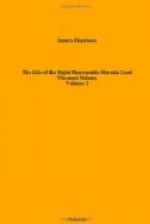In another codicil, dated on board the Victory, at sea, the 19th of February 1804, his lordship gives and bequeaths to Lady Hamilton five hundred pounds a year, charged on the Bronte estate; and, the 7th of April following, leaves an annuity of one hundred pounds, payable quarterly, to poor blind Mrs. Nelson, the relict of his late brother Maurice: without noticing, in either of these codicils, his adopted daughter, Miss Horatia. On the 19th of December, however, in the same year, by a fifth codicil, executed on board the Victory, in the Gulph of Palma, Sardinia, his lordship confirms anew his legacy to Lady Hamilton, and to his adopted daughter: and farther gives to her ladyship two thousand pounds; to his secretary, John Scott, Esq. one hundred pounds, to buy a ring, or some token of his remembrance; and two hundred pounds to his friend, the Reverend Alexander Scott, then commonly called Dr. Scott, by way of distinction from John Scott, Esq. his lordship’s secretary, and who has since taken his doctor’s degree in the university of Cambridge. This distinguished legacy, and the still more distinguished words in which it is bequeathed—not my foreign secretary, chaplain, &c. but “my friend, the Reverend Alexander Scott,”—must ever bear ample testimony of a regard, even at that period, which does Dr. Scott so much substantial honour. The foundation of this amity, like all Lord Nelson’s strongest attachments, was not merely private friendship, and personal regard, but esteem and affection arising from the ability and zeal of the party to assist the grand object ever uppermost in his mind, that of accomplishing, in every possible way, by artifice opposed to artifice, as well as arms to arms, the happiness and glory of his king and country. Dr. Scott’s secret services, though very properly concealed from the public, are well known to, and liberally acknowledged by, several of the ablest and bravest commanders in the navy; and it was thus, still more than by his unaffected and agreeable manners in private life, that he endeared himself to our incomparable hero, who constantly possessed the most exalted degree of genuine patriotism combined with the truest and most unbounded loyalty. This sentiment must not be overlooked in the contemplation of Lord Nelson’s character. There cannot, perhaps, be a single proof adduced of the hero’s violently strong attachment to any individual whatever, though he was a friend to the whole human race, and to every description of worth, if he did not, at the period of expressing




